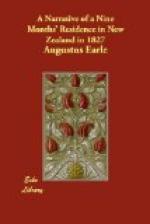The New Zealand method of “courtship and matrimony” is a most extraordinary one; so much so, that an observer could never imagine any affection existed between the parties. A man sees a woman whom he fancies he should like for a wife; he asks the consent of her father, or, if an orphan, of her nearest relation, which, if he obtains, he carries his “intended” off by force, she resisting with all her strength; and, as the New Zealand girls are generally pretty robust, sometimes a dreadful struggle takes place; both are soon stripped to the skin, and it is sometimes the work of hours to remove the fair prize a hundred yards. If she breaks away, she instantly flies from her antagonist, and he has his labour to commence again. We may suppose that if the lady feels any wish to be united to her would-be spouse, she will not make too violent an opposition; but it sometimes happens that she secures her retreat into her father’s house, and the lover loses all chance of ever obtaining her; whereas, if he can manage to carry her in triumph into his own, she immediately, becomes his wife. The women have a decided aversion to marriage, which can scarcely be wondered at, when we consider how they are circumstanced. While they remain single, they enjoy all the privileges of the other sex; they may rove where they please, and bestow their favours on whom they choose, and are entirely beyond control or restraint; but when married their freedom is at an end; they become mere slaves, and sink gradually into domestic drudges to those who have the power of life and death over them; and whether their conduct be criminal or exemplary, they are equally likely to receive a blow, in a moment of passion, of sufficient force to end life and slavery together! There are many exceptions to this frightful picture; and I saw several old couples, who had been united in youth, who had always lived in happiness together, and whose kind and friendly manner towards each other set an example well worthy of imitation in many English families.
CHAPTER LII.
A MAORI TANGI.
April 2nd.—This day, perceiving that an unusual number of canoes were passing up the river, all proceeding towards the village of Par-Finneigh, we hailed one; and, upon its coming alongside, we inquired what had occurred, for every appearance of bustle or commotion amongst this restless and war-like people is truly alarming. They informed us that the great chief A-Rowa, who died four months since, and the ceremony of whose “lying in state” I had been permitted by his eldest son to be a witness of, was this day to be exposed to the view of his friends; was to be cried over; and was finally to be deposited in the tomb of his ancestors. As this was one of their imposing spectacles which I had never yet seen, I was anxious to witness it. We soon got a boat ready, and a party of us joined the throng, and proceeded with them to the village. Upon our




